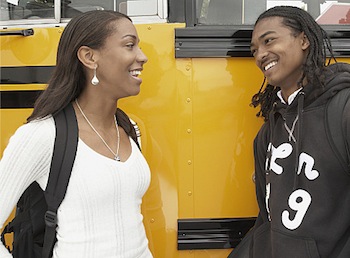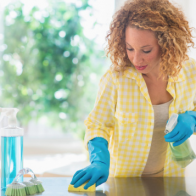 According to the Center for Disease Control, U.S. high school students surveyed in 2009 that 46% had sexual intercourse, 34% had sexual intercourse during the previous 3 months and, of this specific group, 39% did not use a condom the last time they had sex and 77% did not use birth control pills or the Depo-Provera shot to prevent pregnancy the last time they had sex. Additionally, 14% had sex with four or more people during their life.
According to the Center for Disease Control, U.S. high school students surveyed in 2009 that 46% had sexual intercourse, 34% had sexual intercourse during the previous 3 months and, of this specific group, 39% did not use a condom the last time they had sex and 77% did not use birth control pills or the Depo-Provera shot to prevent pregnancy the last time they had sex. Additionally, 14% had sex with four or more people during their life.
Here’s the bad news:
Nearly half of the 19 million new STDs each year are among young people ages 15 to 24 years old. More than 400,000 teen girls ages 15-19 years old gave birth in 2009. And approximately 8,300 young people ages 13-24 years in the 40 states reporting to the CDC had an HIV infection. (Sexual Risk Behavior: HIV, STD, and Teen Pregnancy Prevention, CDC, 2009)
Here’s the good news:
During the past two decades, the teen pregnancy rate has plummeted 40%, the teen birth rate is down by one-third, and both rates declined among all racial and ethnic groups. In particular, the pregnancy rate for black teens declined 44% and the teen birth rate went down an impressive 47%. Across all ethnic groups, the teen pregnancy and birth rates declined because more teens delayed sex longer, and those who did have used contraception more often and more effectively. (Under Pressure: What African-American Teens Aren’t Telling You About Sex, Love, and Relationships, The National Campaign to Prevent Teen and Unplanned Pregnancy, 2011)
 The bottom line is while most adults pray for youth to abstain from sexual activity until adulthood, young people are exploring their sexuality and need our guidance. Admittedly, it’s scary. The above statistics certainly make most adults think of strapping chastity belts around their sons and daughters, but frankly, that’s not the smartest or most effective move to keep our young people safe, conscious, and healthy.
The bottom line is while most adults pray for youth to abstain from sexual activity until adulthood, young people are exploring their sexuality and need our guidance. Admittedly, it’s scary. The above statistics certainly make most adults think of strapping chastity belts around their sons and daughters, but frankly, that’s not the smartest or most effective move to keep our young people safe, conscious, and healthy.
It’s not abnormal for our youth to have sexual desires, even in their early teens. With the onset of puberty comes the release of all sorts of hormones, not to mention our sex-saturated media landscape that our youth consume each day. So long as there is free speech and capitalism, there will not be a cultural shift toward more modest media programming. And so long as children physically develop into adults through puberty, those hormones aren’t going anywhere.
 For the past two decades, it seems that sex educators have taken the lead in talking to our youth about sex and relationships. In high school, I remember the herpes and crabs pictures plastered on the overhead projector and the manner in which my face contorted into disgust. I remember the rumors of a condom demonstration in the near future with bananas as props; it never came. And I remember the brief introduction to birth control, but I never really understood how any of the products worked to prevent pregnancy in my body or its side effects. Therefore, I didn’t use a routine hormonal birth control until I was 20. Instead, I stuck to the basics, condoms and occasional Plan B pills.
For the past two decades, it seems that sex educators have taken the lead in talking to our youth about sex and relationships. In high school, I remember the herpes and crabs pictures plastered on the overhead projector and the manner in which my face contorted into disgust. I remember the rumors of a condom demonstration in the near future with bananas as props; it never came. And I remember the brief introduction to birth control, but I never really understood how any of the products worked to prevent pregnancy in my body or its side effects. Therefore, I didn’t use a routine hormonal birth control until I was 20. Instead, I stuck to the basics, condoms and occasional Plan B pills.
I began having sex at the age of 15. All of the sex education mentioned above occurred my junior and senior year, after my first time. But my condoms and Plan B pills “solution” came from my father’s early recommendation during my pre-teen years: don’t get pregnant or else “the baby stays and you go” and make sure your partner always wears a condom. Thankfully, my 16-year-old boyfriend knew how to put on a condom because I certainly didn’t have a real clue. And when it came to additional contraception, I didn’t start using the Plan B pill until I got to college. I learned it was an option because of the political hoopla surrounding the new legislation that would allow it to be sold over the counter. But I was still fearful of other hormonal birth controls, primarily due to watching my girlfriends go through horrible experiences on the pill or after getting the Depo-Provera shot.

Admittedly, I turned out fine. Yet, I’m still amazed that scare tactics are the primary foundation of sex education without any real lessons on the power of sex in general. It’s certainly helpful to know all of the horrible things that could happen if you engage in oral sex or sexual intercourse, but what about the positive aspects? What about the pleasure? What about any consequent emotions? What about same-sex desires? I was taught the basics of how to take precaution and preserve my (hetero)sexual health. I never received guidance on how to get in touch with my personal sexual desires and learn pleasure’s relationship to my body.
 Understandably, there are parents and youth that still feel uncomfortable initiating conversations on sex with each other. I never wanted to ask my parents about sex. My stepmother acted as if it didn’t exist until I was in college, but my father made a conscious effort to make sure I knew enough to prevent him from being a grandfather. Lucky for me, my family went to church, but my father never preached the “sex after marriage” narrative, he called it unrealistic. But I know plenty of friends that did experience the majority of sex education at home with their parents quoting religious doctrines. Frankly, it wasn’t effective and there were unfortunate consequences from that approach. We can’t tell people how to raise their children, but one thing is for sure: sex is an individual choice. The individual decides, the individual engages in the act, and the individual gets the experience.
Understandably, there are parents and youth that still feel uncomfortable initiating conversations on sex with each other. I never wanted to ask my parents about sex. My stepmother acted as if it didn’t exist until I was in college, but my father made a conscious effort to make sure I knew enough to prevent him from being a grandfather. Lucky for me, my family went to church, but my father never preached the “sex after marriage” narrative, he called it unrealistic. But I know plenty of friends that did experience the majority of sex education at home with their parents quoting religious doctrines. Frankly, it wasn’t effective and there were unfortunate consequences from that approach. We can’t tell people how to raise their children, but one thing is for sure: sex is an individual choice. The individual decides, the individual engages in the act, and the individual gets the experience.
To paraphrase the words of sex educator and author Jaclyn Friedman, the reality is that we have to trust people, we even have to trust young people. Instead of telling our youth, “this is a productive way to express your sexuality and this is a degrading way to express your sexuality,” we have to equip our youth with the tools to assess risk and reward, and then let them make their own choices.
If we love our youth, the best thing we can do is honor their individuality and humanity, prepare them for sex with as much information as possible, and be open about our personal experiences.
After all…if you won’t be a resource, a teacher, an elder…can you really blame our youth for a collective failure?
Be open. Be truthful. Don’t withhold information. Talk.
October is Let’s Talk Month, but it doesn’t stop after 31 days. What are you doing to guide our youth on sex, sexual health, and sexuality? Speak on it.






